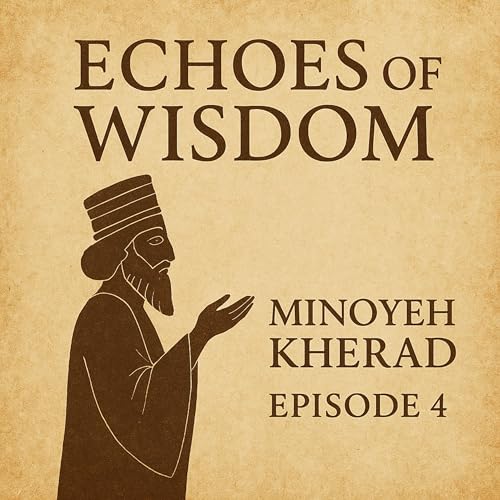
Beyond Blindness Ancient Persian Wisdom on Happiness,Fate and the Cosmic Plan
Failed to add items
Add to basket failed.
Add to Wish List failed.
Remove from Wish List failed.
Follow podcast failed
Unfollow podcast failed
-
Narrated by:
-
By:
About this listen
Briefing Document: "Minoyeh Kherad" (Spirit of Wisdom) Excerpts
This document summarizes key themes from "مینوی خرد کتاب گویا بخش ۴" (Minoyeh Kherad Audiobook Part 4), a dialogue between a wise man (دانا) and the Spirit of Wisdom (مینوی خرد). It explores ethical, spiritual, and philosophical questions from a Zoroastrian perspective.
I. Good, Evil, Happiness, and Misfortune
The Spirit of Wisdom contrasts outer appearances with inner truth. False joy gained through sin is “worse than sorrow” (166). Living with fear and lies is “worse than death” (188), since true happiness sustains life. Apathy arises from forgetting mortality and judgment, caused by Ahriman’s deception (17). True wealth lies in contentment: “The poor man content with little is richer than the wealthy dissatisfied one” (24). Blindness of the heart is worse than blindness of the eyes, for the ignorant cause more harm than the malicious (25).
II. Consequences of Unrighteous Conduct
The text details punishments for various wrongdoers. The disruptor of world and spirit suffers fiery torment after death (20). The mocker’s body becomes a vessel for evil and in hell they are mocked by a demon (20). Those neglecting duty often die young. The vengeful suffer the heaviest punishments, since vengeance endures for generations, as in the feud of Salm and Tur with Iran (20). The lazy are deemed “most unworthy,” with no place made for them by Ahura Mazda; feeding them is a sin (20). The deceitful thinker doubts even worship and earns only ill repute (20). Those who scorn others lose friends, their prayers are rejected, and in hell they face demons of contempt (20).
III. Destiny, Effort, and Divine Will
Human effort cannot create what is not destined, yet destiny comes sooner through effort (21). Wisdom too cannot oppose fate: when destiny arrives, the wise may falter while the ignorant succeed (22). Yazatas grant blessings, but Ahriman, through planetary influence, diverts worldly fortune to the wicked (23). Thus good people may suffer while the unjust prosper. Ahura Mazda remains patient, enduring 9,000 years of Ahriman’s assaults, striking only with justice (27).
IV. Kingship, Wisdom, and Legendary Figures
Kings are advised to keep counsel with the wise, avoiding slanderers (19). World affairs unfold by destiny and time, with Zurvan (Time) seen as eternal ruler (26). Legendary kings shaped order:
Gayomard: First man, origin of metals and humanity.
Hushang: Destroyed Mazandaran demons.
Tahmuras: Bound Ahriman, revealed writing.
Jamshid: Built Var-e Jamkard, granted long prosperity.
Fereydun: Defeated Zahhak.
Manuchehr: Avenged Iraj.
Kay Khosrow: Killed Afrasiyab, aided future Saoshyant.
Goshtasp: Accepted Zoroastrianism, pleased Ahura Mazda (26).
V. Attributes of Divine and Human Nature
The dialogue ends with a contrast of qualities:
Most forbearing: Ahura Mazda (27).
Strongest: The celestial sphere.
Sharpest: Human memory.
Happiest: The righteous soul.
Saddest: The soul of evildoers (27).
Conclusion
Minoyeh Kherad presents a structured vision of ethics and destiny, balancing divine justice with human responsibility. It affirms wisdom, contentment, and righteous action as the path to true happiness, while vividly warning of the consequences of vice and ignorance.


